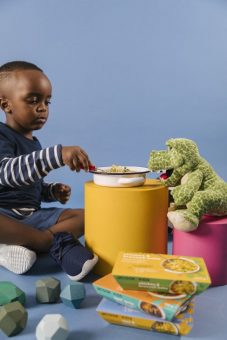
Having a fussy eater is more common than you think and there’s nothing like a food battle with your offspring to raise your stress and anxiety levels. Paediatric Dietician Kath Megaw says that fussy eating in children isn’t just common, it’s completely normal.
‘While we don’t know exactly why kids become fussy, neophobia (the fear of novel foods), seems to be part of the answer. A fear of trying new foods is hard-wired within us from prehistoric times when some of our food choices may have proved poisonous,’ says Megaw.
Fussy eating generally starts after the age of one, a time of empowerment for a little one where they feel the need to assert their authority and eat what they want. Around this stage, the growth spurt slows, and so the demand for energy is less, which means their appetite may be lower, escalating the fussiness. Finally, food may be fuel to us, but to a toddler, it is also power, power to play up to your parents and get their undivided attention!
Megaw recently worked alongside UCOOK to develop a range of nutritious, no-nonsense frozen kid’s meals. She says that witnessing the battles of parents daily inspired her to help develop a range of foods that are attractive to fussy eaters but contain essential vitamins and minerals from a large quantity of hidden vegetables in every dish.

Megaw offers 10 tips for parents of fussy eaters:
You are not alone
30% of children go through a fussy eating phase. Remind yourself of this every time dinner erupts into a full-on food fight. This is a phase and like teething and colic it too will pass, be patient!
Try not to get frustrated
Most children will eat when they are hungry. Whilst feeding your offspring might seem the most natural and basic duty of a parent, it can be a battle. However emotional you feel about your child’s eating habits keep it to yourself as they will only play up if they feel they are getting attention.
Set an example
Mealtimes are important for a family as a focus for communication and bonding. Aim to have everyone eating the same thing in the same sitting. Children mimic their parents, so try to eat all the vegetables you’d like to see them eating.
Have a routine
Schedule three meals and a few small snacks throughout the day and stick to it like clockwork. Allocate 30 minutes for meals and then lift the plate whether it’s finished or not, without making a fuss. Making them sit staring at a cold plate creates negative associations and ultimately adds to your own frustration.
Don’t let them fill up on liquids
Overdrinking is one of the main causes of fussy eating. The tiny stomach of a child is easily filled up with fluid reducing their appetite for food.
Keep trying
As we are hardwired to fear new foods, similarly we favour sweet foods over bitter ones as our instinct tells us the latter might be bad or even deadly. Children like foods that are most familiar to them. If at first you don’t succeed you may need to try 10-14 times before they will actually taste it.
Hide the goodness
Hide your healthy foods in clever ways so that children get used to eating these foods unknowingly. This will train their taste buds without them even knowing about it.
Start small
Avoid offering large portions of food. Aim for small portions, which enable them to ask for more, the holy grail for the parent with a fussy eater! Limit their choices. A huge array of food on a plate will only put them off.
Make it fun
Encourage your kids in the preparation of food and make it fun. Dinosaur pasta and fairy mash sounds much better than boring bolognese and potatoes. Be adept at sneaking vegetables in, concealed in pasta tubes, grated, diced or pureed.
Beware the bribe
If you offer an alternative of chips, biscuits or lollies, then they are sure to perform at the next mealtime knowing you will cave in. Praise a clean plate and avoid confrontation if they have only picked at the food.
Megaw says that many parents feel isolated and alone in these struggles, which is unnecessary. “Ultimately, if your child is displaying worrying symptoms like behavioural issues, fatigue, digestive problems or weight loss seek advice from your Paediatrician, GP or Paediatric dietitian.”
The new UCOOK Kids Frozen range launches with delicious options including UCOOK Kids Beef Rump Bites & Root Veg Mash and Mushroom Bites & Root Veggie Mash as well as old favourites like Mac & Cheese and Chicken & Broccoli Bake.
Published by
See more at https://www.ucook.co.za/craft-kids.
Also read: Link between your actions and child’s behaviour




